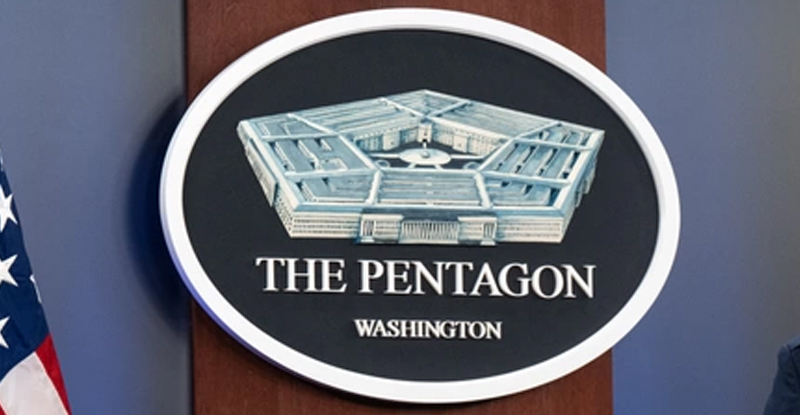By Suzanne Bowdey | Washington Stand
While the media is hyperventilating over Pete Hegseth’s tattoos and Donald Trump’s military deportation plan, there’s a lot more boiling under the surface of America’s national defense.
What will change and how soon is the talk of the Pentagon now, where plenty of high-ranking officials are dusting off their resumes before the ax falls.
But it’s not like they weren’t warned. Asked what the returning commander-in-chief would do with the leftist generals doing the culture war’s bidding, Trump replied simply, “I would fire them. You can’t have [a] woke military.”
Overhauling the Pentagon won’t be an easy task, no matter who’s in charge. But then, having the right men and women on the job would certainly be a good place to start.
“If the people in your own government aren’t obeying you,” Vice President-elect J.D. Vance insisted, “you have got to get rid of them and replace them with people who are responsive to what the president’s trying to do.But there’s more to do than just replacing the extremist personnel.
Here are four more major problems Donald Trump will have to address to get the military back to fighting shape.
1. Uprooting the Woke Culture of LGBT Activism, DEI, and CRT
“The dumbest phrase on planet earth in the military is ‘our diversity is our strength,’” Defense Secretary nominee Pete Hegseth told Shawn Ryan in a long and wide-ranging interview. “Every time I hear a military leader say [it], I throw up in my mouth a little bit more, because if they believe it, it shows you how sideways and indoctrinated they are,” he said on “The Right Take” podcast.
Apart from handing a lot of brass their walking papers, there are specific things the Trump administration is preparing to undo, including the hyper-controversial policy Joe Biden implemented of taxpayer-funded abortion travel. That, along with ending the troops’ outrageous access to gender transition surgeries, would probably be the first to go. Maybe, Trump insiders say, as early as “day one.” Conservatives are also hopeful that the president-elect will revert back to the policy of barring trans-identifying men and women from serving.
There’s also the growing infestation of critical race theory at the military academies that several Republicans have been trying to weed out in federal legislation.
Trump’s former acting Secretary of Defense Christopher Miller expects that to be a “major priority” of the new administration. This team will want to “eliminate Marxist indoctrination and divisive critical race theory programs and abolish newly established diversity, equity, and inclusion offices and staff.”
That would be just fine with Lt. Colonel (Ret.) Robert Maginnis, FRC’s senior fellow for National Defense.
“The Left has accelerated social re-engineering of the military, especially during President Obama’s eight years in office — and most recently under President Biden.
Pushing DEI and a radical woke agenda within the ranks poisons retention, recruitment, and morale,” he told The Washington Stand.
“Most importantly, it undermines unit cohesion, which is the key component of unit readiness. Most members of our armed forces understand the damage done within the ranks and look forward to President-elect Trump cleaning house and ridding our military personnel of the burden of such radical training and enforcement.”
Another question begging to be answered is how the incoming leadership will handle women in combat. FRC has been vocally opposed to the idea for years, and Americans don’t have to guess where Trump’s nominee for Defense secretary stands.
“I’m straight up just saying we should not have women in combat roles. It hasn’t made us more effective. Hasn’t made us more lethal. Has made fighting more complicated,” Hegseth argued in the interview with Ryan.
Women have a place in the military, he said, just not in special operations, artillery, infantry, and armor units. “They could be medics or helicopter pilots or whatever,” Hegseth explained on “The Ben Shapiro Show.” “But they create all sorts of variables and complications that have nothing to do with being anti-women and everything to do with having the most effective military.”
2. Filling the Recruitment Vacuum
According to FRC’s Lt. General (Ret.) Jerry Boykin, there are two reasons young people don’t want to join the military.
“One is related to COVID and the 8,000 people that we [kicked] out of the military” over their objections to the vaccine.
“Now stop and think about this,” he said. “Eight thousand were put out, and the Army alone was short 25,000 people last year in their recruiting goal. Why is that?” Boykin asked. “Part of it is because the people that are being thrown out, or the people that are saying, ‘I have had enough of this, I’m out of here,’ are going back and telling their buddies and their nephews and their friends, ‘Don’t go in the military. They will bully you.’”
Most people in the military have a proud family tradition of service. But, as Boykin pointed out, after something like the vaccine crackdown, “you’re not going to tell people, ‘Oh, man. That was great. You need to go in the Army, Navy, Air Force, whatever.’”
When the former Delta Force commander was a kid, he remembers going out into the woods and playing “army.” “That’s what we all wanted to be: warriors. But today, that’s not the case. Our society is telling men, ‘You’ve got to do something more with your life than … fight[ing] the nation’s wars. … And that’s killing us in terms of recruiting.”
Asked if Boykin would recommend military service to young people today, he admitted, “It’s getting much more difficult for me to do that. Ask me that six months from now.”
Apart from the deemphasis of the military as a career path and the COVID mandate turning off future soldiers, Boykin also blames the way we’re raising today’s young people.
“Here’s a data point,” he shared with host Joseph Backholm on the “Outstanding” podcast, “in the age bracket that is eligible to enlist or to take a commission in the military, 73% of them can’t get in because of [either] obesity, criminal records, [or] drug use. Seventy-three percent,” he repeated. “So what are we drawing from as we go out and try to recruit?”
Maginnis also points out that the pool of largely conservative families that the country relies on for its all-volunteer force is probably the same group who are “offended by the likes of President Biden’s radical DEI/wokeness push.”
“Christians are especially offended by the Left’s radical anti-life, pro-trans, and anti-faith policies and actions. It’s little wonder,” he told TWS, that recruitment is “in the cellar given the policy-making Democratic appointees pushing such extreme views. Hopefully, President-elect Trump will aggressively remove these obstacles for our volunteer cohort and the armed forces will once again fill the ranks with patriots.”
3. Slashing the Pentagon’s Out-of-Control Spending
Eyes popped at the news that the Pentagon failed its seventh audit in a row last week and “cannot fully account for the $824 billion” budget. (The audit itself, The Post Millennial points out, cost a whopping $178 million.)
Joe Biden might be indifferent about where Americans’ hard-earned dollars are going, Senator Tommy Tuberville (R-Ala.) acknowledged on Wednesday’s “Washington Watch,” but
“a new sheriff is getting ready to be in town. His name is Donald Trump. [And] along with his deputies Vivek Ramaswamy and Elon Musk, they are fired up about coming in [to] start throwing stink bombs in all these buildings in Washington, D.C. Let’s do the accounting,” he insisted, “and let’s find out where the taxpayers’ money [is] going. We’re tired of spending it. The bureaucracy up here is about 10 layers deep. They never fire anybody. … It’s time [for government officials] to work for the American people. And if you don’t want to do it, retire, do something else. But President Trump is going to get some sense of reality here.”
The reality is, Maginnis added, the Pentagon never passes an audit, “because it can’t account for the heft of taxpayer money spent each year. … It’s plagued by a leaky, inefficient contracting system. Too often, we invest in high-speed weapon systems that end up on the scrap heap, [either] because of technical failures or they become outmoded because of new advances.”
And yes, a massive part of the Pentagon’s budget is spent on personnel, but even that has “ballooned over the past 50 years,” Maginnis noted. This is all split between active and reserve military, civil servants, and contractors — the latter of which has swelled well above what presidents like Ronald Reagan ever imagined.
“The federal workforce grew the contractor supplemental workforce, which is close to the civil servant numbers. In fact,” he pointed out, “it was common knowledge that we often had more contractors in both Iraq and Afghanistan during those wars than we had uniformed military personnel. So, there is no doubt the Pentagon spends a lot of money. And there is plenty of opportunity to reverse that history,” Maginnis emphasized, “but it won’t be without significant disruption.”
4. Restoring Readiness
Under Biden, the concept of “peace through strength” was virtually extinct. America’s enemies seized on the weak and feeble administration to launch wars, surpass our technology, and threaten vulnerable countries. Israel, Ukraine, Afghanistan, Taiwan, and so many others bore the brunt of Biden’s preoccupation with transgender pronoun videos and drag queen story hours.
It’s a far cry from the scene Boykin recreated in 1962 when Douglas MacArthur stood on the balcony above the West Point mess hall and looked down at the students there. “He pointed his finger, and he said, ‘Your mission’ — that means the mission of the Army — ‘remains fixed, determined, inviolable. It is to win the nation’s wars.’”
That hasn’t changed, the decorated veteran said. But the administration’s commitment to it has.
“You can’t spend all of your time on nonsense like this DEI stuff and expect to be ready when it’s time to go to war. And that’s what we have to do is get back to that. And I think Donald Trump understands that,” Boykin said.
“And I think he’s going to make a huge difference. … I would say you’ll never regret serving in the military. I can’t say that right now because of the bullying that has taken place and people that have been thrown out or have just recognized that there is no place in our military for them and left on their own. But I think it’s important that we recognize that a strong military is essential to our national defense. And it’s not just because they can fight our enemies, it’s because they are a deterrent to our enemies. And that’s what we need.”
Maginnis agreed, pointing out that “all but the U.S. Marines are weak or marginal regarding their readiness.” This has been born out in study after study — most recently the Commission on National Defense Strategy’s, which proclaimed America’s military “not prepared” to fight in any major war.
“We are overstretched to fulfill our global obligations,” the colonel warned, “in part because the president’s national security strategy only calls for the military services to be manned and equipped to fight one regional war at a time. Unfortunately,” he continued, “our world is currently very dangerous, and the threats that warrant our Armed Forces’ attention exceed our resources.”
Decades ago, after the great wars, the Pentagon “fielded a force capable of fighting at least two major regional conflicts — and more. Not only is our strategy wrong for this dangerous world,” Maginnis shook his head, “but we are falling behind the likes of the Chinese in technology and sheer capability. Unfortunately, even if we can fix our spending problem, we will likely need to budget more taxpayer funds to build a military fit to fight the host of threats at our door. Meanwhile, we strain our budget to get sufficient flying hours, exercises, and training ammunition to keep our forces ready. This is a serious matter.”
And the sobering reality, Tuberville underscored, is that “we don’t have another chance.”
“This will be the last time in your and my lifetime,” he told Perkins, “[that] we’ll have a chance to save this country. We only have two years to do it. President Trump is going to hit the ground running, and we have to put everybody on notice that … you protect the American people, and you do everything you possibly can to fix these problems so that] people here can live a lot better life.”
Suzanne Bowdey serves as editorial director and senior writer at The Washington Stand.








Leave a Comment